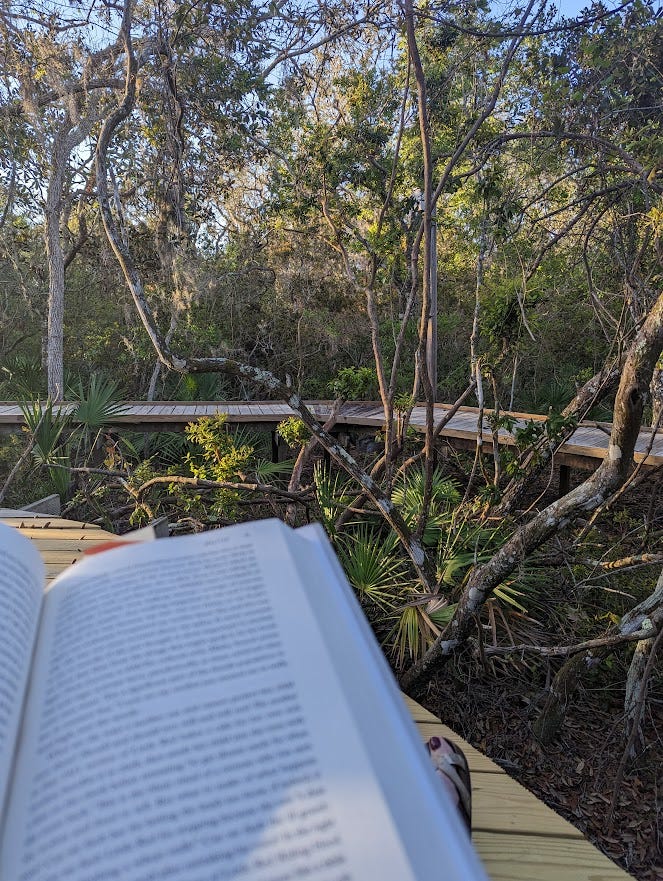

Discover more from Write More, Be Less Careful
whatever you can do is good enough
how to keep writing when there's really no time to write + in-person and zoom options to write together this spring
Welcome to Write More! This is the monthly intentions email, which (ordinarily!) goes out the last Sunday before a new month starts, but is late this month! Last month, we talked about how tools from narrative psychology can help get you unstuck in your writing life. This month, I’m sharing some thoughts on making time for writing and how to keep at in a really busy season.
I’m thinking again, always about time. I’ve been feeling super frazzled this semester—I’m on meeting my most non-negotiable deadlines and staying mostly on top of my grading, but everywhere else, I feel like I’m constantly being stretched in at least two directions. Can anyone else relate?
So I thought for this month, we’d talk a bit about time—not in the sense of time management, necessarily, because thinking of time as just another resource to be managed is so grim, but instead how to assess how much time you actually have, how to (maybe) steal or make a little more, and what to do if you genuinely don’t have much time to write right now.
What time do you actually have for your writing?
I’ve learned so much from novelist and planner extraordinaire Erin Flanagan, but perhaps the most central thing is still this: if you’re making a plan for your writing life, you start by figuring out how much time you actually have for your writing. All fall, when I was working away on deadline for my next book, The Good Mother Myth, I’d sit down each Sunday and block out my writing time. I was focused and ruthless about dodging anything I could to preserve that time. But this year, with the book in and other projects a little more flexible, I’d just stopped doing that. Every week I’d make a list of things to work on, then they just . . . wouldn’t get done. So I’m recommitting to taking my own good advice and figuring out what time is actually available for me, then carefully guarding it for writing.
(If you want more of Erin’s wisdom and more big-picture strategies for planning your writing life, you can find more tips here and here and watch the video from our fall planning party, linked below. (As long as you promise to never comment on the face I’m making in that screenshot below 😳 🤦.)
And what if there really isn’t enough time?
What I’ve learned, from looking at my calendar more carefully in the last couple of weeks, is that I actually just don’t have much writing time right now. It’s all the usual reasons—teaching three writing-intensive classes, a bunch of other work-work, lots of family travel. I think a certain kind of productivity expert, a write-every-day-if-you-want-to-be-a-real-writer type, would tell me I’m just not trying enough, that I should work harder, sleep less etc, but you know what? I’m sick of that message. I’m in a really busy season right now, and I’d bet a lot of you are, too. That doesn’t make me less of a writer. What I’m trying to do is find ways to work more writing in around the margins and keep my writing brain going—and not beat myself up for not hitting a high word count every day.
In other words: whatever you can do is good enough.
If you’re writing for an hour every morning before work, that’s great. And if you’re writing in 15- or even 5-minute chunks, that’s great, too. I wrote huge chunks of Pocket Universe with my notebook propped against my steering wheel, in the 5 minutes before I really had to go teach a class or pick my kids up from daycare. I puzzled through the structure for The Good Mother Myth in voice memos I’d record into my phone on my long commute.
That advice—whatever you can do is good enough—comes courtesy of a pilates instructor I love, who also frequently says this, in the middle of a mind-bendingly hard workout (why are those tiny movements *so painful*?):
You can modify. You cannot quit.
And that’s my goal in my writing life, too. If I’m in a busy season that genuinely doesn’t allow for long stretches of writing, scolding myself isn’t going to change that. But I’m also not going to stop writing, or tell myself I’ll get back to it when there’s time, because, as Julia Ridley Smith reminded us all recently, “The time doesn’t magically appear. You have to make the time.”
A few ideas for how to modify when you might be tempted to quit:
pre-deciding: if you’re going to make the most of little scraps of time to work, you can’t waste that time deciding what you’re going to write. You need a stack of little assignments that you can pick up whenever you have a moment or two to spare. I first learned about this strategy from
, who shared this approach when I interviewed her:For a while over the summer, I did a Lynda Barry thing, which was that I just put a bunch of words in a cup. And then my thing that I would do in the morning was draw a word and write 10 images that came up from that word and then pick one of them to expand.
You might have a list of scenes or images or characters you’re developing. I’ve got a list of questions and topics I’m circling around, and whenever something sparks, I jot it down.
scrap writing: let yourself scribble down whatever fragments come to you, in whatever time you have. I ran out of the end of a barre class the other day in a scramble to get a couple ideas that came unstuck during class, and in the five minutes of stretching I missed, I was able to get a couple of sentences that will become part of something eventually. What’s important in a busy season is to grab whatever you have, and not be too precious about how or where you’re recording it.
write everywhere: I’ve taken to keeping little notebooks in all my purses and in my gym bag, and I still sometimes have to write on the back of a receipt or whatever else I can find. If I wait until I can sit at my desk with my offical notebook, the spark is often gone.
The big picture here is that we’re laying the groundwork for the writing you’ll do when you have a longer stretch of time. It’s the inverse, really, of the process that Emily Mohn-Slate, of
, described in her great essay on transforming journal entries into polished drafts. What you’re trying to do now is give yourself lots of materials to work on later.What do you do to keep your writing brain going when you can’t sit down for hours to write?
March Intentions
three questions to consider as you think about your writing life this month:
Map out your month on the calendar. What time is actually available for your writing? (And what can you scale back, dodge, or quit to make a little more time?)
What are your big yeses for the month or the season? What are you really excited about?
If you’re in an especially busy season, what can you do now to lay the groundwork for your writing once your time opens up a little?
What does your time look like this month? How are you making space for your writing or stowing away good lines and ideas for the future?
let’s write together this spring
✒️ There are still a few spots at the Get Away to Write-Florida from March 19-24, where I’ll be teaching a poetry workshop, The Gift of Constraint, on writing in form. I’m rounding up my favorite villanelles and sonnets and abcedarians and looking forward to the sunshine, excellent food, and wonderful writers.
🌲 If you’re in or around New Jersey, I’m also teaching at a one-day workshop, Writing in the Pines, on April 13. It’s on campus at Stockton, near Atlantic City. I’ll be leading a workshop in the craft of vulnerability in creative nonfiction, and there are lots of other great workshops in memoir, poetry, and fiction. There’s sliding scale tuition for Writing in the Pines—$80-180 will get you a spot in a workshop, coffee/tea, lunch, and a day in really the loveliest community of writers.
🧐 And a zoom option! I’m teaching a three-session open-genre online workshop, Writing Past What You Know: Strategies for Creative Research, on Wednesday, April 17, May 1, and May 15 from 6-8 pm eastern.

on finding, making, and stealing time for your writing
on keeping a process notebook, asking for help, and untangling the snarl of writer’s block
a few quick tips for writing when you’re worn out
Write More, Be Less Careful is a newsletter about why writing is hard & how to do it anyway. You can find my books here and read other recent writing here.
If Write More has helped you in your creative life, I’d love it if you would share it with a friend.
Subscribe to Write More, Be Less Careful
why writing is hard & how to do it anyway






















I also have little notebooks scattered all over--one in the office, one in the car, one on my nightstand. I'm a big believer in writing in snippets. Also, I write for just five minutes first thing in the morning--my own very condensed version of morning pages :)
I really love that line: you can modify. You cannot quit. Thank you for that and for sharing all of this. Xo